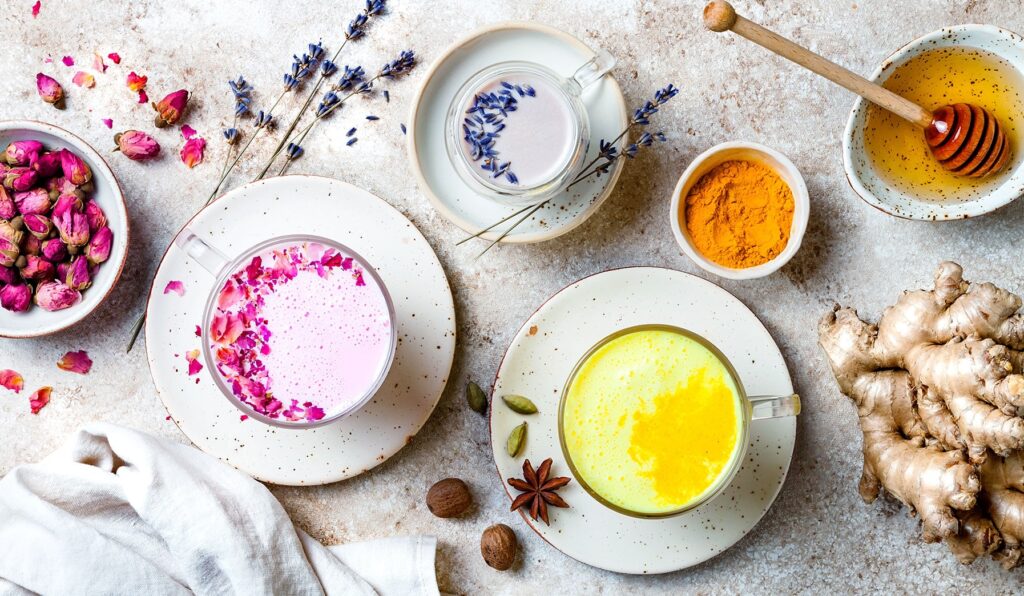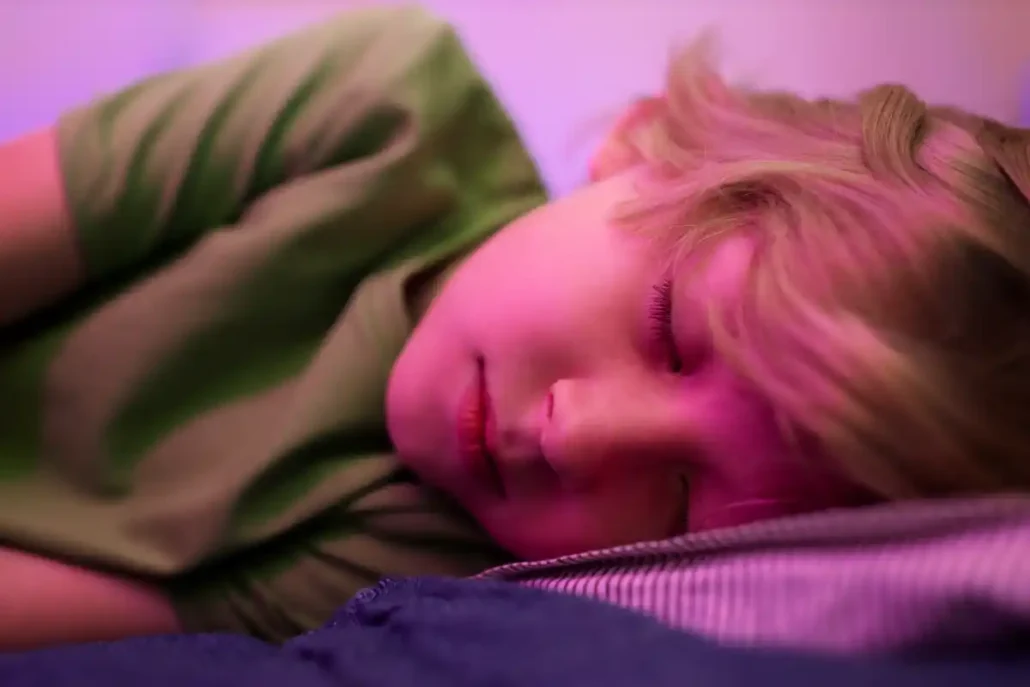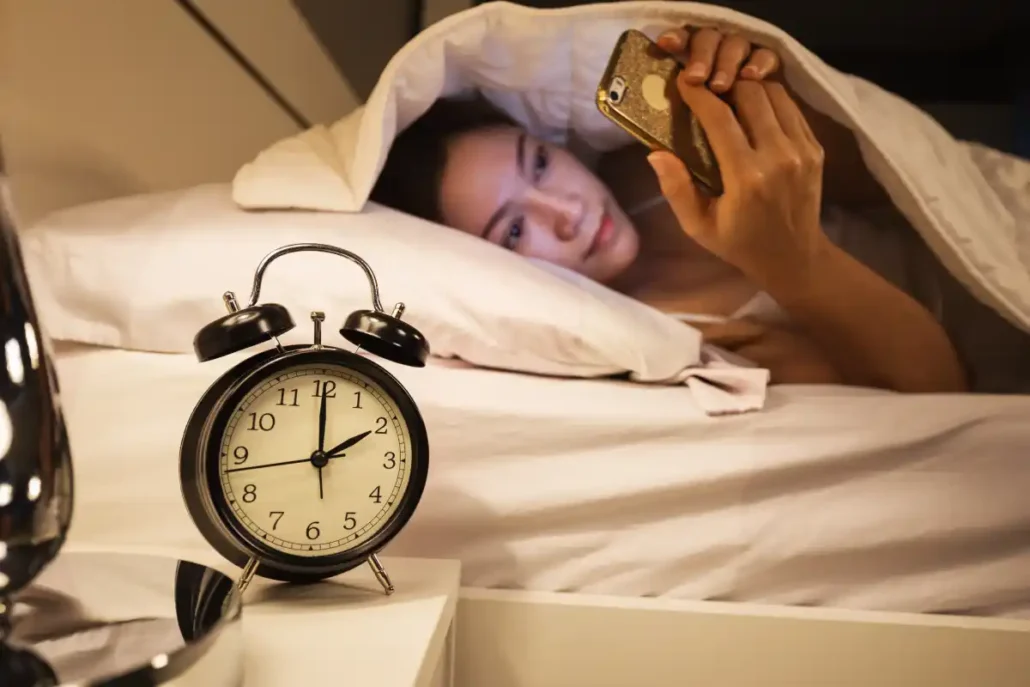
By now, you’ve likely heard of many good habits that help aid in getting a restful sleep, like tossing your phone to the side and turning over (literally). Beyond adopting these good sleep habits, the simple truth remains that you sleep how you eat. What’s on your plate truly matters when it comes to setting yourself up for success in bed – getting deep, revitalizing rest. From your brain to your gut, picking out the right bedtime snack, nightcap, or even humidity in your bedroom, can help improve rest and optimize your health. Add these refreshing sleep habits to your nightly routine for the deep sleep you deserve.
Sleep on Your Left Side
People often ask, “What side is better to sleep on, the left or the right?” The best sleep position for most people is to sleep on their left side. While this may be news today, the wisdom originally comes from Ayurveda, India’s 5,000-year-old Science of Life. The left and right sides of the body are very different from one another. For example, the lymphatic system is more dominant on the left side of the body. This is because most of the body’s lymphatic fluid drains into the thoracic duct, which then goes into the left side of the heart, left jugular vein, and left subclavian vein. So, it makes sense that sleeping on the left side benefits the lymphatic drainage system. The lymphatic system is our first line of detox in the body, so it is the first to become congested when overworked.
Sleeping on the left side is also good for the heart. The largest artery in the body is the aorta. The aorta goes from the top of the heart, arches to the left, then goes down to the abdomen. When we sleep on our left side, it is easier for the heart to pump blood downhill into the descending aorta.
For better digestion and elimination, sleeping on the left side is the way to go. The large intestine is situated so it goes up the right side of the stomach area, then across so it can deposit waste into the colon going down the left side. Gravity is once again our ally when we sleep on the left side. After sleeping well, the descending colon is ready for an easy and complete elimination of waste in the morning.
Sleep with a Humidifier
A cool-air humidifier helps bring moisture into a room, which benefits us in many ways. When the air we breathe is too dry, lacking humidity, we can experience respiratory problems such as sinus inflammation, bronchitis, asthma or nosebleeds. Dry air can also make us become dehydrated more quickly. When the body gets dried out, it is more susceptible to bacterial infections. We may experience a dry throat and dry eyes. We may notice dry skin, chapped lips or eczema. On the other hand, when the humidity in a room is at 45-55%, we breathe more easily and sleep more soundly. A humidifier helps to re-moisturize air that has been dried out from weather, or from air conditioning and heating systems, resulting in refreshing sleep that lasts.
Benefits of Sleeping with a Humidifier
Another upside to using a humidifier is you’re much less likely to snore! When you breathe in humid air, rather than dry air, the throat and nasal cavity are less likely to get dried out. The air is free to move through these channels as you breathe, so the snoring sounds don’t occur. If it’s your partner who snores, and you’re the one who is awake because of it, then a humidifier will benefit both of you.
Most newer humidifiers run very quietly, giving just a small amount of white noise, which can be an added benefit to sleep. If you prefer to run a humidifier during the day, then it will likely moisturize the air enough to get you through the night with the humidifier off.
Another way to incorporate humidity into your room is to run a hot shower or bath and let the steam moisturize the room. While you’re at it, a steamy shower will also help open up and moisturize your sinuses.
The Power of Spices
Eating spicy foods is another way to quickly relieve sinus pressure from dry air. If you’re up for it, then try having some hot salsa, jalapeno peppers or chili peppers. Even one bite can make your nose run and eyes water! Just make sure to avoid foods that hinder sleep, and eat your last meal at least 2-3 hours before going to bed to help with digestion.
Add an After-Dinner Drink to Your Bedtime Routine
We’ve all heard how warm milk can settle us into sleep – and it’s true! Ayurveda has an even better beverage for us, which is healthy in many other ways as well. It’s called “Moon Milk,” and it is fabulous! If you are vegan, or just avoiding dairy, then substitute unsweetened nut milk instead. Each ingredient has a purpose. Turmeric is an anti-inflammatory. Cinnamon helps to reduce blood clotting and is an antioxidant. Cardamom is known as the “Queen of Spices,” and it can calm heartburn and nausea. In addition, cardamom is a natural breath freshener! Nutmeg is a natural sleep aid. Ashwagandha soothes the nervous system. Ginger is great for digestion, and ghee is used as a carrier to get all the herbs where they need to go in the body. If you’re looking for a healthy and delicious nightcap, then Moon Milk is it!
Moon Milk Recipe for Better Sleep (1 serving)
1 cup milk (I prefer unsweetened almond milk, but use any kind of milk you like)
½ teaspoon ground cinnamon
½ teaspoon ground turmeric
¼ teaspoon ashwagandha (easy to find online or in Indian grocery stores)
1 pinch of nutmeg
1 pinch of ground ginger
Learn more about the latest sleep habits for optimal health and healing from @BetterSleepOrg @CoffeyTalkSources:
- https://www.nature.com/articles/nature14432
- https://www.kenhub.com/en/library/anatomy/thoracic-duct
- https://www.nycfacemd.com/sinus-health-dry-air/
- https://www.mayoclinic.org/diseases-conditions/snoring/symptoms-causes/syc-20377694
- https://bmcinfectdis.biomedcentral.com/articles/10.1186/1471-2334-13-71
- https://www.bonappetit.com/story/this-recipe-for-moon-milk-is-better-than-counting-sheep
This blog provides general information about sleep and sleep products. The words and other content provided in this blog, and in any linked materials, are not intended to replace a one-on-one relationship with a qualified healthcare professional. This blog should not be construed as medical advice or used to diagnose, treat, prevent or cure any disease or condition. If the reader or any other person has a medical concern, then he or she should consult with an appropriately licensed physician or other healthcare professional. This blog is not a substitute for professional medical advice, diagnosis or treatment, and should not be relied upon to make decisions about your health or the health of others. Never disregard professional medical advice or delay in seeking it because of something you have read on this blog or elsewhere on bettersleep.org. If you think you may have a medical emergency, then immediately call your doctor or dial 911.



